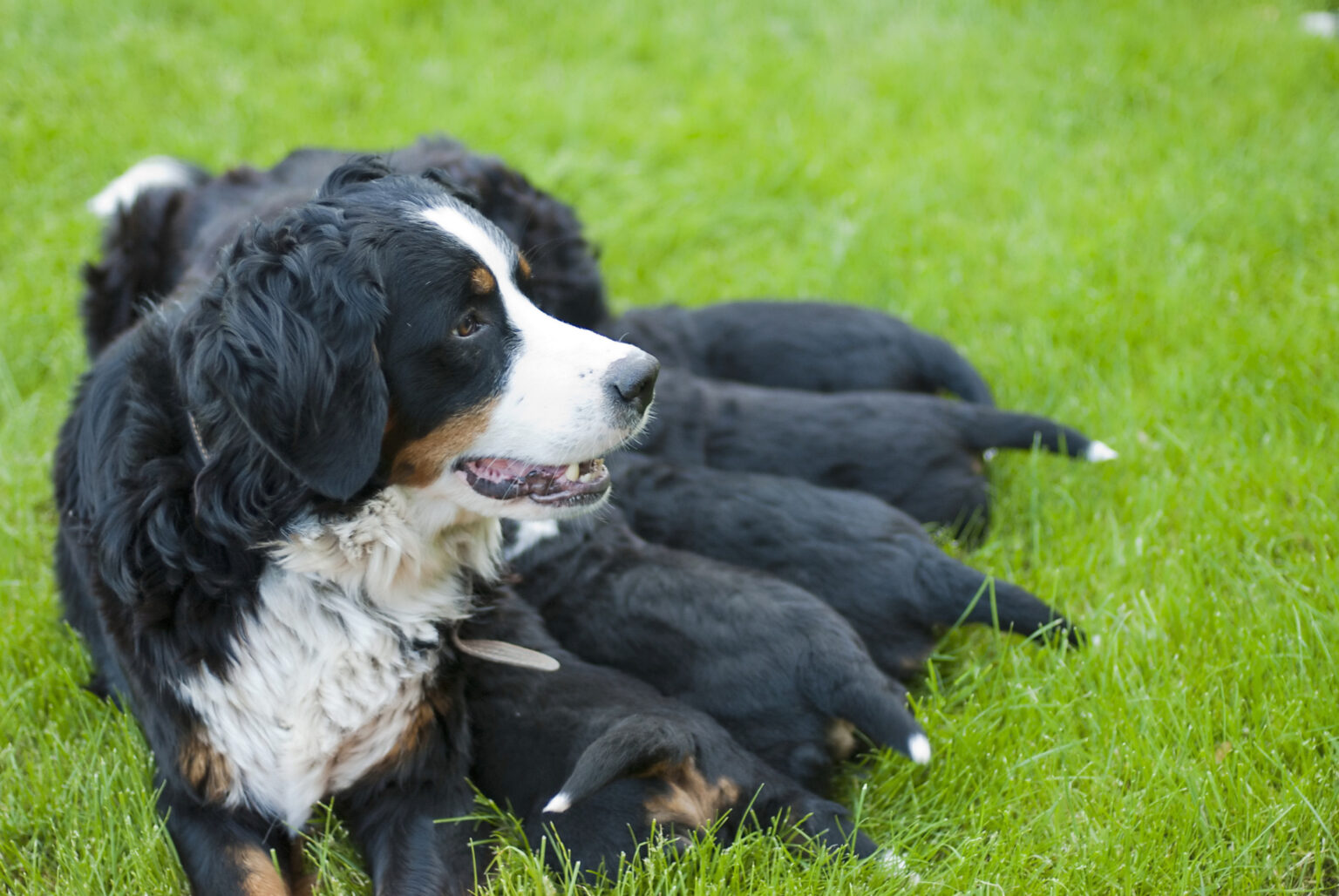In domestic female dogs, sexual maturity is reached between the ages of 6 and 12 months, later for some large breeds. Pregnancy is possible as soon as the first estrus cycle begins but breeding is not recommended prior to the third cycle.
Duration
The time between ovulation and the birth of puppies is between 59 and 65 days (63 days in a large number of cases). The time of mating may not exactly coincide with the time of ovulation and so the time between mating and the birth of the pups can vary much more between 56 and 72 days.
Signs of pregnancy include:
- Discharge from the vulva, starting about one month after mating.
- After about five weeks of pregnancy, the bitch’s weight will start to increase. She is likely to gain 15-25% of her original body weight (depending on the number of puppies) during the remainder of the term.
- During the second half of pregnancy, the bitch’s appetite will increase.
- From day 40 onwards, the bitch’s teats may become more prominent and the mammary glands will enlarge as they fill with milk.
- Changes in behaviour
- Morning sickness
Determining pregnancy
Roughly halfway (approximately 4 weeks after conception) through the pregnancy your dog should receive a check-up from a veterinarian who will confirm pregnancy via palpation and/or urine and blood testing. Ultrasound or x-ray can also be used in the later term. A radiograph can be carried out 3 weeks prior to the delivery to count the puppies. A number of breeders like to have this done so that they can be prepared for the number of puppies the dog is expecting.
Feeding
Feed your pregnant and nursing dog a diet that is highly digestible and contains good-quality ingredients which are higher in nutrients (e.g. a puppy diet). No food increase is required until around 42 days of pregnancy. Five to six weeks into her pregnancy, she will need 30-50% more food than normal to provide sufficient nutrients to her puppies. Give her small and frequent meals to help her eat the amount of food she requires; the growing pups inside her will take up much more room and this will lead to her becoming full more quickly. If you use a good quality, high protein food, supplements will not be necessary.
Royal Canin Starter Mother & Babydog Dry Adult & Puppy Dog Food
- Perfecting for weaning puppies
- Meets the needs of the mother and supports both immune systems
- Contains essential nutrients including protein, rice, animal fats, vegetable protein
- Specially manufactured kibble for smaller mouths
- Supports digestive health and immune systems
Hill’s Science Plan Puppy Healthy Development
- specially developed for medium-sized dogs less than a year old
- contains added omega-3 and DHA from fish oil to support joint and bone health
- antioxidants help to support a growing immune system
- nutritionally balanced
- easy to digest
- 60% meat
- Energy content adjusted to the metabolism of puppies
- Cranberry, rosemary and rosehip to support the immune system
- Prebiotics, probiotics, chicory and camomile to improve digestion and relieve irritation
- A grain-free formula
- No soy, artificial colours or preservatives
Exercise
Carry on exercising your dog, but try to avoid anything too strenuous, especially after the first month of pregnancy. Go on short walks and don’t let her get overtired.
Medications
Many canine medications are safe to use during pregnancy, however, veterinary advice should always be sought to ensure the specific medication you have in mind will cause no harm to the pups. If you give your dog regular preventative medication for heartworm you can continue this throughout the pregnancy.
Vaccinations
Vaccinations should not be given during canine pregnancy. However, if possible, it is a great idea to have your dog vaccinated just before becoming pregnant as this will ensure she has a high level of antibodies to pass onto her puppies during lactation.
Worming
Fenbendazole ( Panacur) is a suitable wormer for pregnant dogs; it is effective against roundworm, hookworm, some lungworm and tapeworms. Pyrantel/praziquantel combinations may also be suitable. The dosage regime will depend on the product you have chosen – always follow pack directions closely and consult your veterinarian or one of our Animal Health Advisors if you are in any doubt about the dosage regime of your chosen product. It is very important to de-worm your bitch from day 42 of her pregnancy until 2 days post whelping to ensure worm infestation is not passed on to the puppies via the placenta and milk. Puppies should be treated from 2 weeks of age every 2 weeks until weaning. Always seek veterinary advice to ensure the correct product is being administered to your bitch and that it is being given at the correct dose and frequency.
Panacur Liquid Suspension & Granules
- Available in 10% Oral Suspension for Dogs & Cats and Granules
- Panacur is very effective against roundworms and other intestinal parasites yet are very kind and gentle on your pet.
- Safe to use on puppies and kittens from 2 weeks of age
- Safe to use during pregnancy and lactation
- Give directly or mixed in food
Preparing for the birth
During the last 3 weeks of pregnancy, it is a good idea to isolate her from other dogs to ensure she does not contract the herpes virus which can trigger a miscarriage.
She may dislike being left alone and will probably become more affectionate if a little irritable. As the delivery date approaches she will start to look for a safe place to give birth. Prepare a whelping box for your bitch two to three weeks before she is due will give her time to become accustomed to it enough that she will choose to give birth in it.



